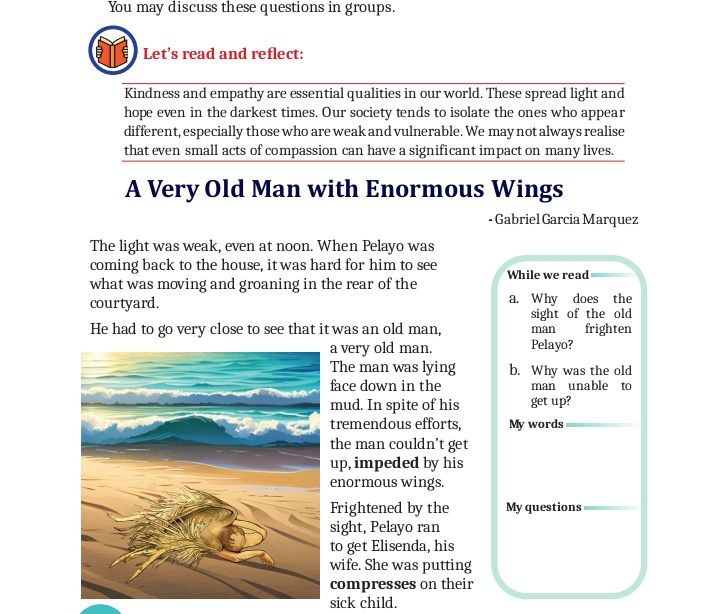Mending Wall
THINK AND WRITE
1. Why does the poet say that there is something that doesn't love a wall?
The poet says that there is something that doesn't love the wall beacause nobody sees or hears anybody breaking the wall. But every spring season, In mending time, the poet finds the wall is broken. So it is clear that there is something that doesn't love a wall and wants to see it broken. It is this 'something' that makes the ground under the wall swell causing the stones of the wall to fall down on to either side.
2. Why does the poet meet his neighbour beyond the hill at spring?
The poet meet his neighbour beyond the hill at spring so that they can fix one day and walk along the wall to mend it by picking up the fallen stones and fixing them back.
3. How does the poet and his neighbour mend the gaps in the wall?
The poet and his neighbour mend the gaps in the wall by walking along the wall on either side and picking up the fallen stones and placing them back on the wall.
4. Why does the poet argue that there is no need of a wall in between his estate and that of his neighbour?
The poet argues that there is no need of a wall in between his estate and that of his neighbour because his land is covered with pine trees and the poet's area is full of apple trees. The poet's apple trees will never go to his area to eat the cones of his pines.
5. How does the neighbour justify the need for walls or fences?
The neighbour justifies the need for walls or fences by saying that 'good fences make good neighbours'.
6. Why does the poet consider the spring season mischievous?
The poet considers the spring season mischievous because it is in that season gaps are found in the walls. He thinks that spring season makes the frozen ground under the wall expanded. Because of this expansion, the wall gets cracks, making the upper stones of the wall fall down on to the sides.
7. What are the contrasting views presented in the poem?
The poet and his neighbour had different views regarding the wall. The poet thinks there is no need of a wall or fences between neighbours, especially when the poet's area has apple trees and the neighbour's area has pine trees. There is no way that the apple trees will trespass into the neighbours estate and eat the cones of the pines. But the neighbour thinks that good fences make good neighbours.
Activity - I : Paragraph writing :
1. Elaborate the idea in the following line in a paeagraph: " Good fences make good neighbours".
In the poem "Mending Wall", Poet's neighbour belives in the idea "Good fences make good neighbours". Good fences make good neighbours means it is good to have some limits betweeen neighbours so that their relation will remain healthy at all times. If there is unlimited freedom between neighbours, trouble will soon start. Suppose you grow cows in your house it may destroy your neighbours garden and farming. And also if both of them have similar orchrds, there is a chance to quarrel regarding their boundaries. So poets neighbour thinks that good fences make good neighbours.
Activity -II (Appreciation)
"Mending wall" is a poem written by Robert Frost. He is an American poet well known for his poems that are colloquial in style. His poems begin in delight and end in wisdom. The poem 'Mending wall' proves this. He starts his poem in a delightful way saying that there is something in nature that does not like a wall. He does not say what that 'something' is. That 'something' makes the ground under the wall swell which results in cracks in the wall. Gradually the stones that make the wall fall to either side.
The fallen stones have lost their shapes. Some look like loaves of bread and others look like balls. It will need some spell or magic to keep the stones balanced on the wall even for a short time. The poet has to command the stones to stay in place at least till he and his neighbour have turned their backs on them. He knows very well that they won't stay there for long.
The gaps in the wall are so big that even two people can pass through them walking side by side. It is funny that nobody ever sees and hears anybody breaking the wall. But every spring timethe wall is broken and they have to repair it. Frost feels there is no need for a wall between him and his neighbour. His neighbour grows pine and he grows apple trees. His apple trees will never get across and eat his cones. And both of them do not have any cows. So poet thinks that there is no need of a wall there. But the neighbour insists that good fences make good neighbours.
Robert Frost has used many poetic devices in this poem. He has used metaphor, similie, personification and repetition. He has used simple language but the imagery is exquisite. It gives a fine message. The poem definitely begins in delight and ends in wisdom. Frost has taught us a good meassage.
Activity -III (Comparison)
Read the lines from Tagore's Gitanjali (Text book, Page : 39)
Summary of stanza 1 : The person whom I enclose in the prison is weeping. I am busy building the wall of the prison. As the wall goes up every day, I lose sight of myself because of the dark shadow cast by the wall.
Stanza 2 : I am proud of this wall. I plaster it with dust and sand. I don't want a single hole in the wall. But as I am busy keeping the other person denying him light and freedom, I am losing sight of my true being.
Now, Compare the above lines with the poem 'Mending Wall'
In the poem 'Gitanjali', Tagore tells us that by denying others freedom we too are losing our freedom. A jailor who is in charge of the prisoners is also spending bis time in jail. The only difference is that the prisoner may be in a room with bars, but the jailor is in the building surrounded by walls. In one sense both are prisoners.
In both poems, the theme is wall. In 'Mending wall', the wall brings healthy relations. But in Tagore's wall, wall is dangerous both to tbe prisoner and also the jailor. But lose their light and freedom. The theme is relevant because some walls are good but some are bad. The language of both poems is simple and straightforward. The style in both poems is elegant. In Mending wall, the author tells us walls have a positive significance as they keep good neighbourliness. But in Tagore's poem, 'wall' is very ruinous beacause it harms the persons on both sides of tbe wall - the prisoner and the jailor.




Comments
Post a Comment
Please share your feedback and questions